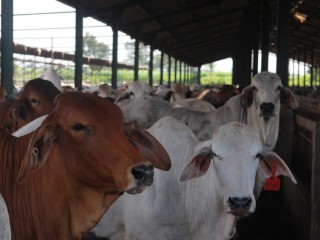 Australia’s live cattle trade to Indonesia has been rocked by yet another serious setback in the form of a new 5pc duty imposed on cattle imports by the Indonesian Government.
Australia’s live cattle trade to Indonesia has been rocked by yet another serious setback in the form of a new 5pc duty imposed on cattle imports by the Indonesian Government.
The 5pc tariff has been introduced on a retrospective basis, meaning that importers are now receiving back-dated bills to cover imports received since January 1.
Beef Central understands that importers have been receiving bills progressively in recent weeks, with some facing charges in excess of A$1 million.
“It’s a shock, and very damaging to the overall competitiveness of our industry long-term,” said one importer, who declined to be named.
The tariff has been levied by Indonesian Customs on cattle imports except “oxen and breeders”.
Confusion surrounds whether that definition includes feeder steers or heifers or both. Despite the lack of clarity, importers have already started receiving retrospective bills for considerable totals dating back to April in recent weeks.
Trade representatives have submitted objection notes to the Government seeking a resolution.
“The main issue lies on the self-interpretation of oxen from customs,” another trade source explained to Beef Central last night.
“We have sent letters to Government officials seeking to solve this and we are waiting for further responses.”
Investigations are also underway to establish whether the new trade restrictions represent a breach of Indonesia’s trade obligations under the ASEAN-Australia-New Zealand Free Trade Agreement or World Trade Organisation rules.
The new imposts are another serious blow for an industry already reeling from the combined impacts of enforced 350kg maximum weight limits on cattle imports since 2010, a two-month trade shutdown by the Australian Government over welfare concerns last year and a halving of annual import quota levels by Indonesia this year.
The 350kg weight restrictions and the reduction in annual import permits from 520,000 head last year to 283,000 head this year are a result of Indonesia’s stated aspirations to reduce its reliance on imports and achieve self-sufficiency in beef production.
Australian Livestock Export Council chief executive officer Alison Penfold met with Indonesian importers in Jakarta last week and said the 5pc import tariff was causing high levels of concern.
“This is going to be potentially millions of dollars and (the importers) obviously have concerns about the tariff, and the way it has been implemented and its consistency with the tariff schedule,” Ms Penfold said.
“Clearly it is a cost impost on industry that is a major concern."
While Indonesia increases restrictions on Australian feeder cattle imports, it continues to express interest in opening its gates to more imports from Latin America.
Ms Penfold said there were reports in Indonesia last week that the Government is considering amending law 18, which currently prevents the importation of meat products into Indonesia from countries that have Foot and Mouth Disease, including those with FMD-free zones such as Brazil.
“We’re concerned about any potential to relax freedom and the potential risk that presents,” Ms Penfold said.
“We’ve been a long standing partner, we’ve got a good product and we can provide country freedom from FMD and we can support Indonesia’s existing FMD status.
“We need to approach this from the fact that we’re neighbours, we both have an FMD free status which is very important to the future of our cattle production industry, and we’re keen to assist Indonesia to strengthen its cattle production and we want to help with a product that we can guarantee is free from FMD.”



HAVE YOUR SAY